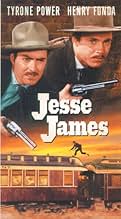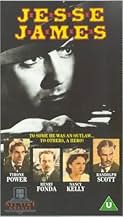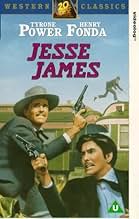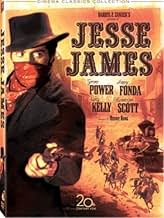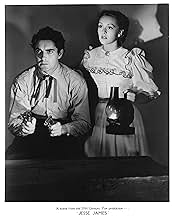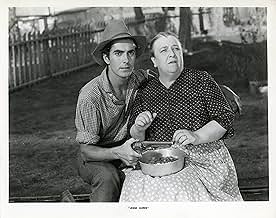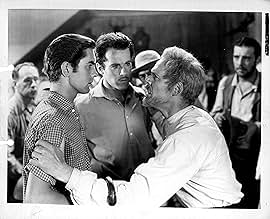AVALIAÇÃO DA IMDb
7,0/10
5,2 mil
SUA AVALIAÇÃO
Adicionar um enredo no seu idiomaAfter railroad agents forcibly evict the James family from their family farm, Jesse and Frank turn to banditry for revenge.After railroad agents forcibly evict the James family from their family farm, Jesse and Frank turn to banditry for revenge.After railroad agents forcibly evict the James family from their family farm, Jesse and Frank turn to banditry for revenge.
- Direção
- Roteiristas
- Artistas
Johnny Russell
- Jesse James Jr.
- (as John Russell)
Avaliações em destaque
If you go to Pineville, Missouri, where part of Jesse James was filmed, and ask about the making of the movie, everyone you meet will tell you the same thing. One of the extras became pregnant by Tyrone Power and gave the baby up for adoption.
When Power learned of this, he spent thousands upon thousands of dollars but never located his offspring. Just think, today she'd drag him into court and sell her story to People. But the times were different.
Frankly, I'm not surprised it happened. Even Power's younger daughter Taryn thinks her father was his most devastatingly handsome in Jesse James. She's right.
Darryl F. Zanuck gave his biggest star a first-class production in color no less. Not remarkable considering that Power in 1939 would hit the pinnacle of his popularity, beating Gable in the year of GWTW in box office receipts.
In this version, Jesse is a folk hero who seeks revenge on the railroad for cheating people out of their property and allowing its representatives to resort to violence against the property owners. That's one way of looking at it.
What puts this movie over is the top-notch cast, headed by Power. Critics could never see beyond his looks, and it is difficult, but his Jesse is ruthless, loving, defeated, and angry as the story demands.
Henry Fonda is perfect as Frank James, and the scene between the two men after Jesse argues with the gang is wonderful. One sees Jesse's pain and feels Frank's concern.
The rest of the cast includes Nancy Kelly, Henry Hull, Brian Donlevy, John Carradine, Jane Darwell, and Randolph Scott - all first-rate.
I'm not a particular fan of westerns, but this one held my interest. Of course, it helps when the Jesse is the stuff dreams are made on.
When Power learned of this, he spent thousands upon thousands of dollars but never located his offspring. Just think, today she'd drag him into court and sell her story to People. But the times were different.
Frankly, I'm not surprised it happened. Even Power's younger daughter Taryn thinks her father was his most devastatingly handsome in Jesse James. She's right.
Darryl F. Zanuck gave his biggest star a first-class production in color no less. Not remarkable considering that Power in 1939 would hit the pinnacle of his popularity, beating Gable in the year of GWTW in box office receipts.
In this version, Jesse is a folk hero who seeks revenge on the railroad for cheating people out of their property and allowing its representatives to resort to violence against the property owners. That's one way of looking at it.
What puts this movie over is the top-notch cast, headed by Power. Critics could never see beyond his looks, and it is difficult, but his Jesse is ruthless, loving, defeated, and angry as the story demands.
Henry Fonda is perfect as Frank James, and the scene between the two men after Jesse argues with the gang is wonderful. One sees Jesse's pain and feels Frank's concern.
The rest of the cast includes Nancy Kelly, Henry Hull, Brian Donlevy, John Carradine, Jane Darwell, and Randolph Scott - all first-rate.
I'm not a particular fan of westerns, but this one held my interest. Of course, it helps when the Jesse is the stuff dreams are made on.
The first western shot in color focuses more on mythology than facts of this famous outlaw. Tyrone Power in the lead role shows acting abilities not seen in his previous movies,and delivers an intense portrayal of Jesse James. Underplaying his part as Frank James to great effect, Henry Fonda steals the movie.Although a supporting part he's missed in the scenes his not in. Randolph Scott as the marshal delivers one of his best performances. Nancy Kelly makes a beautiful love interest for Power. Henry Hull's crusading editor is fun to watch. The movie is wonderful to look at and one of the great westerns.I hope this classic western will be out on DVD soon.
With Ty Power and Hank Fonda in the saddle, there was no way this version of the James Brothers legend was going to paint them as bad guys.
Less so since the courtly southerner Nunnally Johnson wrote and produced the yarn. In reality the James boys took to knocking off banks and trains after being at a loose end following Missouri's joining the losing side in the War Between the States. This was too painful a scab to pick in the Thirties, so Johnson gives the Jameses a more palatable enemy than Abe Lincoln: big bad railroad barons upsetting their ma. And he paints his outlaws with a populist tint, to please New Deal Democrats as well as Dixiecrats who knew the real backstory.
However, the broad outlines of their rise and fall are intact. We see a gradual slide into semi-chivalrous villainy (they didn't rob train passengers, only mails), a 'Liberty Valance'-like exploitation of their coups by political orators and editors, Jesse's becoming consumed by his own legend, and the final botched bank job at Northfield, Minnesota. That leads to a panicky flight and an attempt to live semi-respectably under pseudonyms, followed by Bob Ford's betrayal as Jesse turns art curator.
The film is pleasingly quiet between action set pieces, free of the obtrusive music that was often the curse of Hollywood soundtracks and laced with good lines from Johnson's florid pen. And above all, surrounded by good character actors, we have two rising Zanuck stars tussling enjoyably for mastery, both in the plot and career-wise.
Henry King had become Power's preferred handler ('In Old Chicago' the previous year had been a wow) and both men evidently relish the challenge of tweaking his 'nice bank teller' image a little. Swarthy and bearded betimes, barking out orders to older subordinates, Power does fine. Fonda's grand remonstrance, when he tells Junior that he's turning into a suicidal psycho, is ably played and paced. The soft early tripack Technicolor looks sweet both outdoors-- Ford was getting similar results in 'Drums Along the Mohawk'-- and in candle-lit interiors.
Also noteworthy is Jesse's respectful, confiding relationship with his black ex-slave Pinky (Ernest Whitman) when he decides not to pursue Frank. Black maids could sass their mistresses in crazy comedies, but this quality of understanding between men of different colours was unusual in early-talkie Hollywood.
'Jesse James' was released in Hollywood's peak year, 1939. It's understandable that it was overlooked. But when we've done finger-wagging at the cruelty to horses which led the American Humane Association to demand supervisory privileges over stampedes-- and the cruelty to female Central Casting members which allowed Power to father a child on one-- we can still appreciate a good, workmanlike travesty of outlaw history. As a distortion of the James-Younger saga it has not been surpassed.
Less so since the courtly southerner Nunnally Johnson wrote and produced the yarn. In reality the James boys took to knocking off banks and trains after being at a loose end following Missouri's joining the losing side in the War Between the States. This was too painful a scab to pick in the Thirties, so Johnson gives the Jameses a more palatable enemy than Abe Lincoln: big bad railroad barons upsetting their ma. And he paints his outlaws with a populist tint, to please New Deal Democrats as well as Dixiecrats who knew the real backstory.
However, the broad outlines of their rise and fall are intact. We see a gradual slide into semi-chivalrous villainy (they didn't rob train passengers, only mails), a 'Liberty Valance'-like exploitation of their coups by political orators and editors, Jesse's becoming consumed by his own legend, and the final botched bank job at Northfield, Minnesota. That leads to a panicky flight and an attempt to live semi-respectably under pseudonyms, followed by Bob Ford's betrayal as Jesse turns art curator.
The film is pleasingly quiet between action set pieces, free of the obtrusive music that was often the curse of Hollywood soundtracks and laced with good lines from Johnson's florid pen. And above all, surrounded by good character actors, we have two rising Zanuck stars tussling enjoyably for mastery, both in the plot and career-wise.
Henry King had become Power's preferred handler ('In Old Chicago' the previous year had been a wow) and both men evidently relish the challenge of tweaking his 'nice bank teller' image a little. Swarthy and bearded betimes, barking out orders to older subordinates, Power does fine. Fonda's grand remonstrance, when he tells Junior that he's turning into a suicidal psycho, is ably played and paced. The soft early tripack Technicolor looks sweet both outdoors-- Ford was getting similar results in 'Drums Along the Mohawk'-- and in candle-lit interiors.
Also noteworthy is Jesse's respectful, confiding relationship with his black ex-slave Pinky (Ernest Whitman) when he decides not to pursue Frank. Black maids could sass their mistresses in crazy comedies, but this quality of understanding between men of different colours was unusual in early-talkie Hollywood.
'Jesse James' was released in Hollywood's peak year, 1939. It's understandable that it was overlooked. But when we've done finger-wagging at the cruelty to horses which led the American Humane Association to demand supervisory privileges over stampedes-- and the cruelty to female Central Casting members which allowed Power to father a child on one-- we can still appreciate a good, workmanlike travesty of outlaw history. As a distortion of the James-Younger saga it has not been surpassed.
Splendid in his first Western and his first Technicolor movie, Power portrayed Jesse James as a sympathetic hero and the most charming bank robber of the Old West
Teamed with Henry Fonda, and stalwart Randolph Scott, Henry King came with a Western classic, considered as one the best Jesse James of the series
The film opens in Pineville with hothead Jesse and temperate Frank as a couple of Missouri brothers who, embittered by the ruthless tactics of a railroad agent, got a warrant and had to skip out, hiding out until Major Rufus Cobb (Henry Hull) can get the governor to give them a fair trial But the railroad's got too much at stake to let two farmer boys bollix things up
After they had thrown Barshee (Brian Donlevy), the brutal railroad representative off the farm of their widowed mother (Jane Darwell) when she refused to sign over her property, Jesse and Frank later learn that she had been killed by a bomb tossed into their home by Barshee himself Jesse returns, shoots Barshee, and vows revenge on the railroad, with the complete sympathy of the Missouri populace
Jesse's sweetheart, Zee and her uncle, publisher Major Rufus, are among the James' supporters, as is U. S. Marshal Will Wright (Scott), but he has a job to do and is forced to track down the two brothers
Jesse and Frank have expanded their operation from merely harassing the St. Louis Midland with a series of holdups to robbing banks
Pursuaded by railroad president McCoy (Donald Meek) to talk Jesse into surrendering, Wright extracts a written promise of a light sentence for the desperado Zee then urges Jesse to give himself up following their wedding
Of course, Henry King tries to show how Jesse hated the railroads and from that hate he presented a charismatic hero But this hero was not going to last The more luck he had, the worse he gets It'll be his appetite for shooting and robbing until something happens to him
He also shows a worried fiancée keeping thinking of an outlaw all the time out there in the hills just going on and on to nowhere just trying to keep alive with everybody after him, wanting to kill him to get that money
There's a scene near the end where Zee (Nancy Kelly) after delivering her baby is lying in bed with her creature, with the presence of the Marshal, so to speak, between herself and her uncle that suddenly made clear to me what the entire film was about Her feelings as a woman: "I'm so tired to care. This is the way it always is. We live like animals, scared animals. We move. We hide. We don't dare to go out "
Obviously she is a sensitive woman who exposes her being on screen without losing sight of reality That's quite a great scene from King, and key in this great Western, as it's really all about her character, Zee Cobb, a struggling woman in love now a mother with a baby to take care of
So please don't miss it!
Teamed with Henry Fonda, and stalwart Randolph Scott, Henry King came with a Western classic, considered as one the best Jesse James of the series
The film opens in Pineville with hothead Jesse and temperate Frank as a couple of Missouri brothers who, embittered by the ruthless tactics of a railroad agent, got a warrant and had to skip out, hiding out until Major Rufus Cobb (Henry Hull) can get the governor to give them a fair trial But the railroad's got too much at stake to let two farmer boys bollix things up
After they had thrown Barshee (Brian Donlevy), the brutal railroad representative off the farm of their widowed mother (Jane Darwell) when she refused to sign over her property, Jesse and Frank later learn that she had been killed by a bomb tossed into their home by Barshee himself Jesse returns, shoots Barshee, and vows revenge on the railroad, with the complete sympathy of the Missouri populace
Jesse's sweetheart, Zee and her uncle, publisher Major Rufus, are among the James' supporters, as is U. S. Marshal Will Wright (Scott), but he has a job to do and is forced to track down the two brothers
Jesse and Frank have expanded their operation from merely harassing the St. Louis Midland with a series of holdups to robbing banks
Pursuaded by railroad president McCoy (Donald Meek) to talk Jesse into surrendering, Wright extracts a written promise of a light sentence for the desperado Zee then urges Jesse to give himself up following their wedding
Of course, Henry King tries to show how Jesse hated the railroads and from that hate he presented a charismatic hero But this hero was not going to last The more luck he had, the worse he gets It'll be his appetite for shooting and robbing until something happens to him
He also shows a worried fiancée keeping thinking of an outlaw all the time out there in the hills just going on and on to nowhere just trying to keep alive with everybody after him, wanting to kill him to get that money
There's a scene near the end where Zee (Nancy Kelly) after delivering her baby is lying in bed with her creature, with the presence of the Marshal, so to speak, between herself and her uncle that suddenly made clear to me what the entire film was about Her feelings as a woman: "I'm so tired to care. This is the way it always is. We live like animals, scared animals. We move. We hide. We don't dare to go out "
Obviously she is a sensitive woman who exposes her being on screen without losing sight of reality That's quite a great scene from King, and key in this great Western, as it's really all about her character, Zee Cobb, a struggling woman in love now a mother with a baby to take care of
So please don't miss it!
Spectacular as well as exciting Western talks the lives of Jesse and Frank James ; featuring notorious interpretations by a popular group of known stars . This is a slight and intelligent biopic about Jesse James who ranks with Billy the Kid as the most famous of Western outlaws . Legend and folklore have cast him as a Robin Hood , a good boy forced by circumstances to follow a criminal life . The picture provides a good portrait of Jesse and his band , as they move from Civil War to there territory becoming into semi-legends . As showing his home life in Missouri, his experiences with Quantrill's raiders and his career of banditry . As Jesse (Tyrone Power) and Frank (Henry Fonda) along with cousins Cole , Bob and Jim Younger return from War to find their mommy (Jane Darwell) and family threatened by railway people . As Barshee (Brian Donlevy) was hired by the railroad company run by Mc Coy (Donald Meek) to hunt down Jesse and Frank . So James Brothers commence to robbin' banks and trains to help out the poor folks who been done wrong . In the course of their revenge , they will become the object of the biggest manhunt in the history of the Old West . Along the way , Jesse courts attractive young , Zerelda (Nancy Kelly) . As their fame grows, so will the legend of their leader, a young outlaw by the name of Jesse James . At the end , he is betrayed by the Ford brothers , Charlie and Bob (John Carradine) .
This is a sprawling and glamorous Western with excellent performances from Tyrone Power and Henry Fonda . The film gets spectacular shoot em'up , thrills , exciting horse pursuits . A glimmer Western with a wild bunch look-alike that ends up into a fateful final . Packs colorful scenarios, moving pace and slick edition . This is a decent look about the known story of the West's greatest bandit , Jesse James , along with Frank , Cole Younger and brothers with acceptable performances and compelling direction creating some good action scenes . The picture shows nice as well as spectacular frames , as when both Jesse and Frank going off the cliff on horseback , in reality the stunt was performed once and shot with two cameras. After the two horses that were blindfolded and forced to go over a cliff were killed, a new rule was enforced and later endorsed by The Humane Society of America in which strict standards were created to protect Animal Actors in which at the end of the movie and added to the credits listed as "No Animals Were Harmed or Injured in the Production of this Film" ; now all films involving any Animal Actors must have present a member representing The Humane Society of America to insure that all animals are treated humanly and given a safe environment in which to work. As originally conceived by screen writer Nunnally Johnson along with contributing writers as Curtis Kenyon , Long and Gene Fowler . Taut excitement throughout , beautifully photographed by George Barnes and W. Howard Greene . The motion picture was well realized by Henry King .
It was followed by a sequel : ¨The return of Frank James¨ (1950) by Fritz Lang with Henry Fonda . Other films about this legendary outlaw are : ¨I shot Jesse James¨ by Samuel Fuller with John Ireland as Bob Ford ; ¨Jesse James vs the Dalton (1954)¨ by William Castle with John Ireland . ¨The true story of Jesse James¨ (1957) by Nicholas Ray with Robert Wagner , Jeffrey Hunter , Hope Lange , Agnes Moorehead ; in which footage from the original 1939 production was used when Frank and Jesse go over a cliff on horseback into a river and when they crashed , on horseback, through a store window during the "Northfield Minnesota Raid" . And contemporary-style Western such as ¨Frank and Jesse¨ by Robert Boris with Rob Lowe as Jesse James , Bill Paxton as Frank James and Randy Travis as Younger ; ¨American outlaws¨ by Les Mayfield with Colin Farrell , Gabriel Macht , Terry O'Quinn , Harris Yulin and Ali Larter ; and ¨The Assassination of Jesse James by the Coward Robert Ford¨ (2007) by Andrew Dominik with Brad Pitt , Sam Shepard , Mary Louise Parker , Casey Affleck and Sam Rockwell.
The picture lavishly produced by Darryl F Zanuck was based on actual events , these are the followings : At the war's end in 1865 , Jesse rode in to surrender and was shot and seriously wounded by a Union soldier . Jesse and his brother joined the Confederate guerrillas of Quantrill and learned to kill in ruthless company . It is believed that Jesse took part in his first robbery in 1866 when a dozen men held up the bank in Liberty , Missouri . A bank cashier was killed in the raid and a reward was offered for each of the James brothers . In 1873 Jesse and his band derailed and robbed a train on the Rock Island line . Jesse married his cousin Zerelda , who bore him two children . Pinkerton detectives were contracted to chase Jesse and Frank , the agents surrounded the home , believing they to be there , tossed a bomb and the explosion killed Jesse's young half-brother . This outrage brought much sympathy for the brothers . On 1876 Jesse and Frank in company the three Younger Brothers , attempted a bank robbery at Northfield , Minnnesota , and walked in disaster . The alerted citizens opened fire on the raiders , of the eight bandits involved , three were killed and three Younger brothers were captured .
This is a sprawling and glamorous Western with excellent performances from Tyrone Power and Henry Fonda . The film gets spectacular shoot em'up , thrills , exciting horse pursuits . A glimmer Western with a wild bunch look-alike that ends up into a fateful final . Packs colorful scenarios, moving pace and slick edition . This is a decent look about the known story of the West's greatest bandit , Jesse James , along with Frank , Cole Younger and brothers with acceptable performances and compelling direction creating some good action scenes . The picture shows nice as well as spectacular frames , as when both Jesse and Frank going off the cliff on horseback , in reality the stunt was performed once and shot with two cameras. After the two horses that were blindfolded and forced to go over a cliff were killed, a new rule was enforced and later endorsed by The Humane Society of America in which strict standards were created to protect Animal Actors in which at the end of the movie and added to the credits listed as "No Animals Were Harmed or Injured in the Production of this Film" ; now all films involving any Animal Actors must have present a member representing The Humane Society of America to insure that all animals are treated humanly and given a safe environment in which to work. As originally conceived by screen writer Nunnally Johnson along with contributing writers as Curtis Kenyon , Long and Gene Fowler . Taut excitement throughout , beautifully photographed by George Barnes and W. Howard Greene . The motion picture was well realized by Henry King .
It was followed by a sequel : ¨The return of Frank James¨ (1950) by Fritz Lang with Henry Fonda . Other films about this legendary outlaw are : ¨I shot Jesse James¨ by Samuel Fuller with John Ireland as Bob Ford ; ¨Jesse James vs the Dalton (1954)¨ by William Castle with John Ireland . ¨The true story of Jesse James¨ (1957) by Nicholas Ray with Robert Wagner , Jeffrey Hunter , Hope Lange , Agnes Moorehead ; in which footage from the original 1939 production was used when Frank and Jesse go over a cliff on horseback into a river and when they crashed , on horseback, through a store window during the "Northfield Minnesota Raid" . And contemporary-style Western such as ¨Frank and Jesse¨ by Robert Boris with Rob Lowe as Jesse James , Bill Paxton as Frank James and Randy Travis as Younger ; ¨American outlaws¨ by Les Mayfield with Colin Farrell , Gabriel Macht , Terry O'Quinn , Harris Yulin and Ali Larter ; and ¨The Assassination of Jesse James by the Coward Robert Ford¨ (2007) by Andrew Dominik with Brad Pitt , Sam Shepard , Mary Louise Parker , Casey Affleck and Sam Rockwell.
The picture lavishly produced by Darryl F Zanuck was based on actual events , these are the followings : At the war's end in 1865 , Jesse rode in to surrender and was shot and seriously wounded by a Union soldier . Jesse and his brother joined the Confederate guerrillas of Quantrill and learned to kill in ruthless company . It is believed that Jesse took part in his first robbery in 1866 when a dozen men held up the bank in Liberty , Missouri . A bank cashier was killed in the raid and a reward was offered for each of the James brothers . In 1873 Jesse and his band derailed and robbed a train on the Rock Island line . Jesse married his cousin Zerelda , who bore him two children . Pinkerton detectives were contracted to chase Jesse and Frank , the agents surrounded the home , believing they to be there , tossed a bomb and the explosion killed Jesse's young half-brother . This outrage brought much sympathy for the brothers . On 1876 Jesse and Frank in company the three Younger Brothers , attempted a bank robbery at Northfield , Minnnesota , and walked in disaster . The alerted citizens opened fire on the raiders , of the eight bandits involved , three were killed and three Younger brothers were captured .
Você sabia?
- CuriosidadesAfter the two horses that were blindfolded and forced to go over a cliff were killed, a new rule was enforced and later endorsed by The Humane Society of America in which strict standards were created to protect animals. Productions that met the standards of the Humane Society were allowed to add "No Animals Were Harmed or Injured in the Production of this Film" to the end credits. Eventually all the studios agreed that films involving any animals must have present a representative of The Humane Society to ensure that all animals are treated humanely and given a safe environment in which to work.
- Erros de gravaçãoThe movie shows a bomb killing Frank and Jesse's mother. In reality, the bomb thrown through the window by the Pinkerton agents killed their little brother and seriously wounded their mother, who survived although she lost an arm in the explosion.
- Citações
[last lines]
[about Jesse James]
Major Rufus Cobb: He was one of the doggonedest, gawl-dingedest, dad-blamedest buckaroos that ever rode across these United States of America!
- Cenas durante ou pós-créditosOpening credits prologue: After the tragic war between the states, America turned to the winning of the West. The symbol of this era was the building of the trans-continental railroads.
The advance of the railroads was, in some cases, predatory and unscrupulous. Whole communities found themselves victimized by an ever-growing ogre - the Iron Horse.
It was this uncertain and lawless age that gave to the world, for good or ill, its most famous outlaws, the brothers Frank and Jesse James.
- Versões alternativasAll UK versions were cut by 13 secs by the BBFC to remove footage of horse-falls including the controversial scene of a horse fatally falling from a cliff.
- ConexõesEdited into Homem e Mulher Até Certo Ponto (1970)
- Trilhas sonorasThe Battle Cry of Freedom
(1862) (uncredited)
Written by George Frederick Root
Played by the band at the railroad station
Principais escolhas
Faça login para avaliar e ver a lista de recomendações personalizadas
- How long is Jesse James?Fornecido pela Alexa
Detalhes
- Data de lançamento
- País de origem
- Idioma
- Também conhecido como
- Jesse James - Lenda de uma Era Sem Lei
- Locações de filme
- Empresa de produção
- Consulte mais créditos da empresa na IMDbPro
Bilheteria
- Orçamento
- US$ 1.600.000 (estimativa)
- Faturamento bruto mundial
- US$ 3.444
- Tempo de duração
- 1 h 46 min(106 min)
- Cor
- Proporção
- 1.37 : 1
Contribua para esta página
Sugerir uma alteração ou adicionar conteúdo ausente



